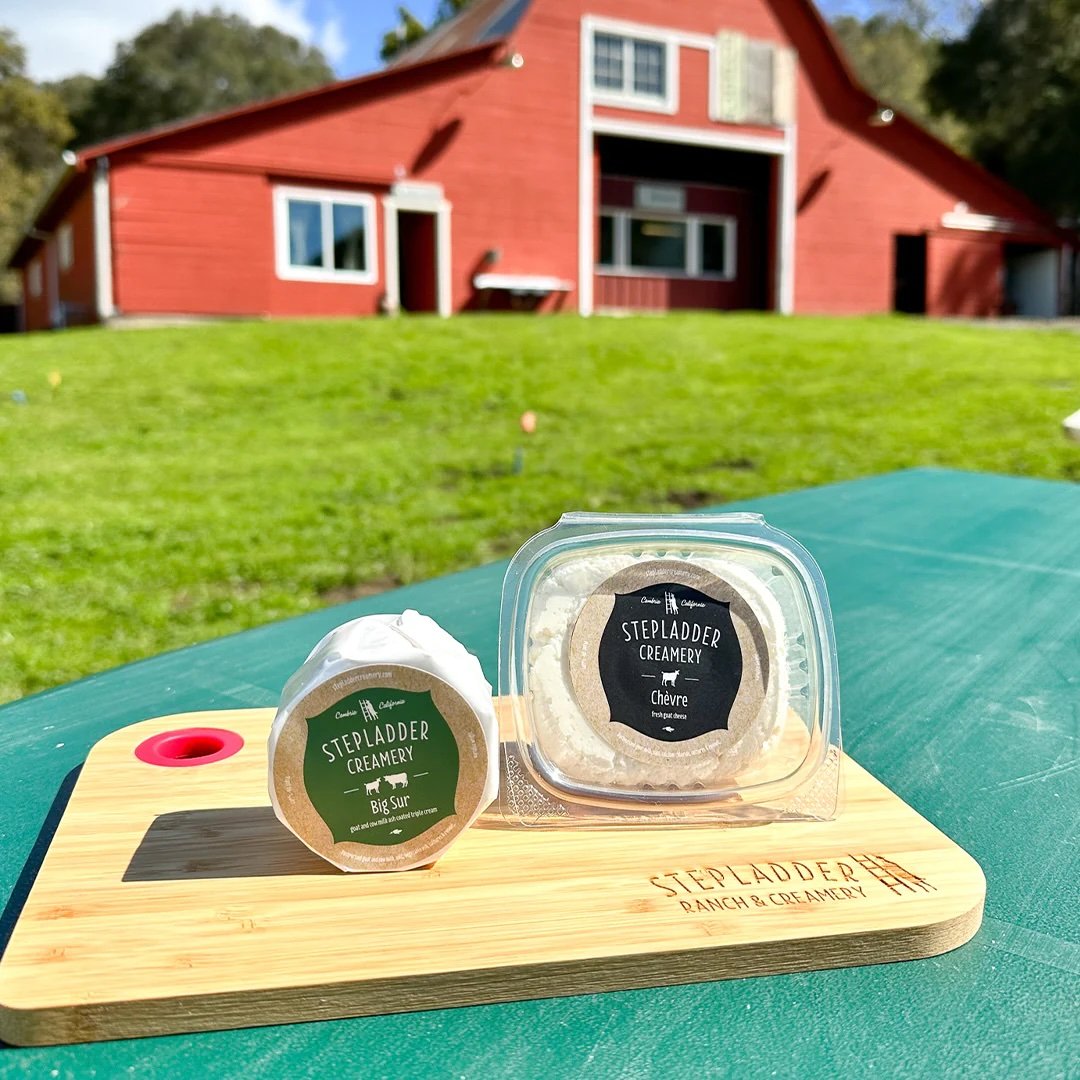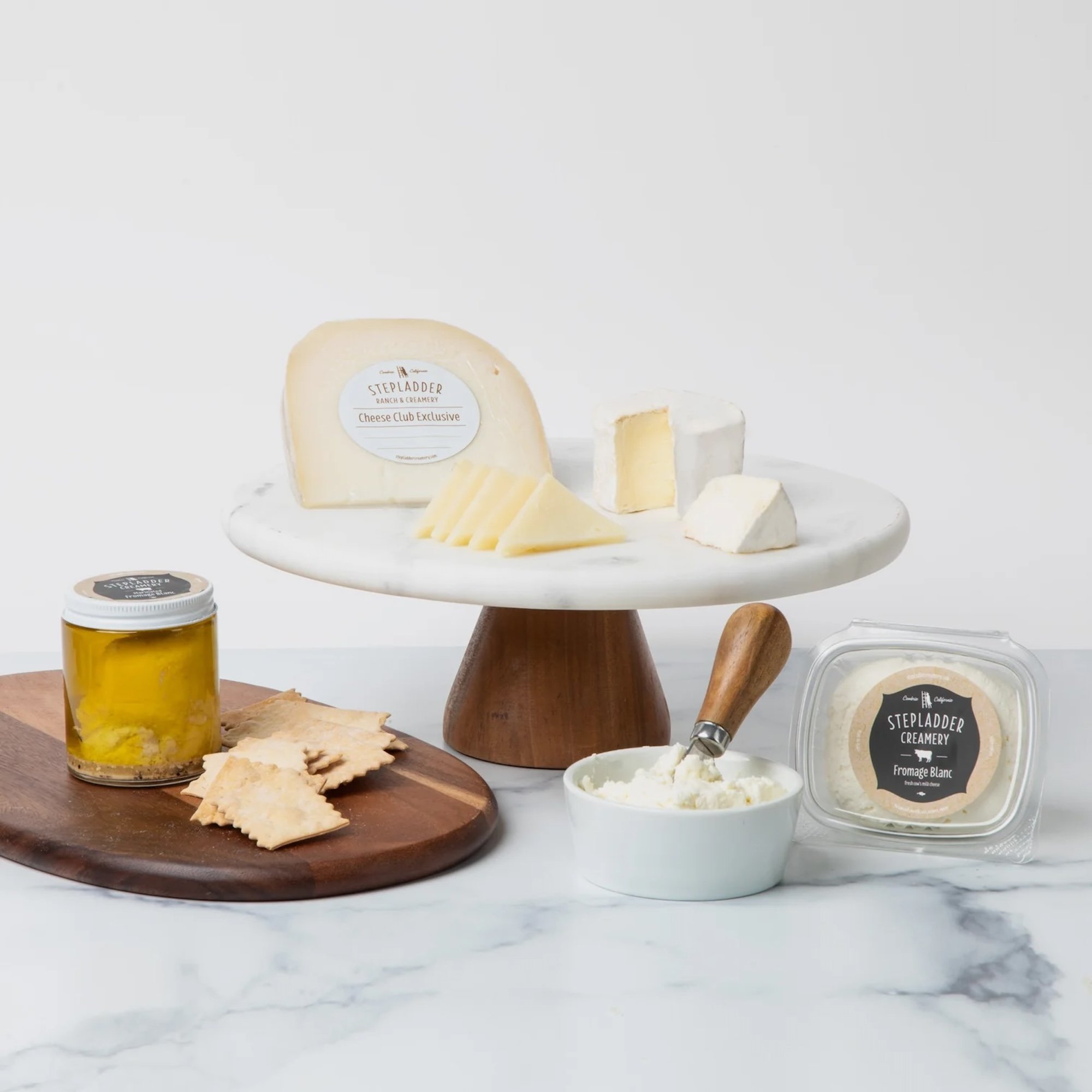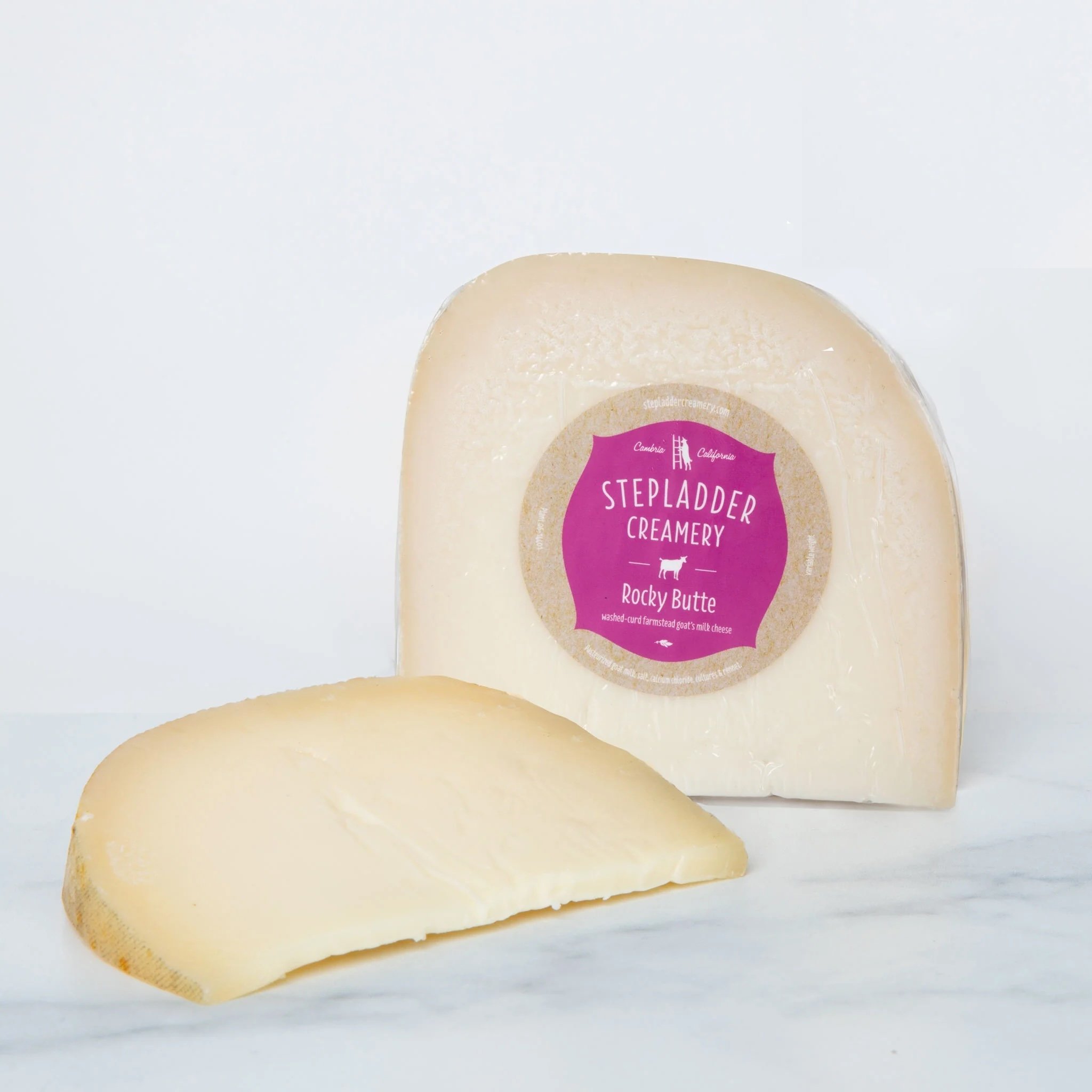Producers We Love: Stepladder Ranch & Creamery, Cambria, CA
Michelle and Jack Rudolph, owners of Stepladder Ranch
The origin story of Stepladder Ranch & Creamery is a lesson in following your heart. It is also all about goats. And it is a love story. None of it would have happened if a young Jack Rudolph had not visited Harley Farms in Pescadero with his family for one of their magical barn loft farm dinners. Jack thought to himself, “I want to do something like this one day,” and the first step for that was to buy some goat milk and make some cheese at home. His day to day at that point was working at a startup in Palo Alto, a far cry from his rural life on the Central Coast today. Needless to say (and this is where the following your heart part comes in), he realized that he found way more joy in home cheesemaking (and many other homesteader projects like bread baking and fermenting) than in working a tech job.
History of the Ranch
Stepladder Ranch & Creamery cheeseboard
A bit of family luck and opportunity comes into play in this story as well, in the form of a grandfather who had purchased Stepladder Ranch in the 1980’s in the lush hills just south of Hearst Castle in Cambria. The name Stepladder predates his family, indicating the 1700 ft elevation hike to the mountain at the top, yet another reason it’s a suitable property for goats. “We say we are like a stepladder as you climb up to the top,” explains Jack. He quit his job and pivoted into rehabilitating the ranch, slowly gathering some income from the two main crops at the ranch at the time, avocado and beef. But goats were the goal, and he finally got two goats and started making cheese in a tiny house at the ranch. That original aging room is now their office, a nice nod to the evolution of the property and business, which now has a full-blown creamery facility with four main production areas, and utilizing the hundred-year-old barn onsite.
Ramping Up
Stepladder Quarterly Cheese Club cheeses
This inception phase, the first cheeses of which Jack self admits were “pretty sketchy” is where Michelle comes into the picture. She had moved to the area to attend Cal Poly and, as will happen to many college grads, never left. She met Jack and as they began dating, he also coaxed her into farm life, where her background in event planning and wineries paved the way for some of the creative programming, they’ve built at the property today. We are both “Bay Areans that went country,” says Michelle.
These beginning stages, critical first steps in developing a business, have led to a thriving and well-regarded cheese brand. For the first three years, from 2012 to 2015, it was all about home cheesemaking. They finally felt confident enough to begin selling at their small local farmers market in Cambria, just chevre, and then started getting other types of milk and making more cheeses, including some aged.
The Goats
Wanda, goat at Stepladder Ranch
They prefer La Mancha goats over nubians, because “they are hardy, not divas, and they are quiet,” the couple says. “Goats are browsers, not grazers,” says Jack, “so they are looking for leaves, bark, acorns.” He says that the property is not well suited for dairy cattle, but good for goats. “Our employees take them on walks, they eat oak, wild sage, poison oak, it’s all really great for their health but also for the flavor profile for the cheeses. The flavors and colors change with the seasons. We don’t add a lot of stuff to the cheese, just salt to preserve it.”
Bella, goat at Stepladder Ranch
They currently milk between 30-65 goats, and purchase about 1000 gallons of cow milk per week. Their production is over 100,000 pounds of cheese. Not at all a two-person job, the Rudolph’s have a staff of almost twenty plus many farmers market crew members all over the state, selling about fifteen cheeses at markets, grocers and restaurant accounts.
Cheese Profile: Rocky Butte
Rocky Butte cheese
This Gouda-style, 100% goat’s milk cheese is aged at least six months, and named for their view of a granite mass at the end of the Santa Lucia mountain range. The hard, washed-curd cheese is mild, pairing wonderfully with full-bodied red wines and dried red fruit. It is a limited release, only available for purchase online and received a Bronze medal at the 2023 American Cheese Society (ACS) awards competition in the Farmstead Goat’s Milk category.
Stepladder’s portfolio of cheeses is diverse, employing lots of different styles and all kinds of philosophies. Ranging from a spicy Fromage Blanc using Goat Horn Chiles from Oaktown Spice Shop, a couple of triple crème cheeses, one of which, the cow’s milk Ragged Point, was a Good Food Award finalist, California State Fair Gold and ACS winner, to a mixed goat and cow milk aged Manchego style, a luxurious olive oil marinated fromage blanc and even a Breton-style salted cultured butter. The Rudolph’s say that they make “California originals and some European riffs on favorites.”
“Our identity in terms of cheese is not as defined as other businesses,” says Michelle, but one thing they are clearly dedicated to as a business is trying to support similar small businesses and makers. Wellness of animals and their employees is also very important.
More than Cheese
Astonishingly, Stepladder is way more than just a cheese company, and the Rudolph’s ponder their many layers themselves. Both Jack and Michelle are Rare Fruit Growers and every tour includes a seasonal fruit tasting as well as a cheese tasting. The goats get some of the orchard fruit too, but ironically, avocados (their biggest crop) are poisonous to goats. Speaking of tours, that option is a unique component for us customers, a chance to visit Stepladder for an immersive, educational experience in cheesemaking and farming. Plus, with Michelle’s background in hospitality, they offer an agritourism element with the opportunity to actually stay overnight at the ranch. Their cheese club, with a quarterly release, is a really fun way to get a literal taste of their Research and Development, such as the goat milk Reblochon they are currently experimenting with. You can also join the “sponsor a goat” program, giving you first naming rights for the animal who receives “a princess dairy goat life,” admits Michelle. All these goats have photo bios on the website, so you can meet them anytime.
To dive deeper into Stepladder, check out their highly underappreciated Youtube channel, with a ton of great videos about all of the cheeses, goats and guided tastings. They also have a great blog (with some recipes!) and a rich social media presence.
“We really just try to engage with the public a lot!” says Michelle, which is lucky for us indeed.






